 There are few things in cinema more satisfying than watching those with true gifts prosper and develop. Overnight sensations are exciting but watching careers that build slowly, continually showing new facets and amassing fans piecemeal is a richer experience. Such is the case with the actress Sarah Paulson. With her key role as Mistress Epps in the likely Best Picture contender 12 Years a Slave and her starring role on the anthology series American Horror Story (returning to TV tomorrow night), it's time to get our appreciation on.
There are few things in cinema more satisfying than watching those with true gifts prosper and develop. Overnight sensations are exciting but watching careers that build slowly, continually showing new facets and amassing fans piecemeal is a richer experience. Such is the case with the actress Sarah Paulson. With her key role as Mistress Epps in the likely Best Picture contender 12 Years a Slave and her starring role on the anthology series American Horror Story (returning to TV tomorrow night), it's time to get our appreciation on.
I first noticed her in that undersung fanciful homage to 1960s romcoms Down With Love (2003) though her carer stretches back into short-lived television gigs in the mid 90s. When we sat down to talk recently, I confessed to Paulson that I had been completely intimidated by her when I met her at a party for Martha Marcy May Marlene (2011). I had no explanation for this - at the time she hadn't played anything as scary as her plantation wife. "You had an inkling," she mused suggesting I had seen Mistress Epps coming.
But who could have? Who knew she had that in her?
NATHANIEL: 12 Years a Slave is a big moment in your career but it's not your first "breakthrough" really. I'm wondering about how you experience these things internally. When did things change for you, personally, as an artist?
 Sarah Paulson & Jessica Lange. They've got history
Sarah Paulson & Jessica Lange. They've got history
SARAH PAULSON: For me as an artist? Probably when I got The Glass Menagerie, which I did on Broadway with Jessica Lange in 2005. I played Laura Wingfield in the most recent revival before the one that's playing now. I won that role against, at that time, people who were significantly more famous than I.
I just remember -- Jessica Lange was the actress I had most admired and dreamt about having a career that would be like hers, or get roles like hers or kind of go to the same emotional places that she was able to go. And so there I was rehearsing with her for six weeks and acting with her for five months. It was just an extraordinary time. I had just turned thirty years-old. I had done some things prior to that, of course, but it just... that was the moment for me as an actress where I felt like 'Oh my god, you’re an actress on Broadway doing Tennessee Williams playing Laura Wingfled with Jessica Lange. Do you really want to pinch yourself right now, I bet you do!' That was a big moment and probably after that was Studio 60 because it was the first time I did something where people started paying attention. I was nominated for a Golden Globe.
NATHANIEL: I first noticed you in Down With Love. Just loved that!
SARAH: Film wise it was probably Down With Love. That was another. Renée Zellweger had just come off Chicago, Ewan McGregor had just come off Moulin Rouge!, David Hyde Pierce was at the height of Frasier success and there I was this girl that nobody knew. I won that part in a way that was unexpected. I was really young. I was 26 -everyone thinks I’m 40 in that one! It was a character thing and I love doing [affects voice] Fantastical Character. I can’t believe how brave I was to go to the audition and do that. Because I think now -- I’m scared now. It was my naïveté that I just sort of walked in. I had a prop cigarette. I had a wig. I just went for it. That’s probably why I got it. They were like 'damn, this girls got balls'. Now, I would never do anything like that.
 Sarah Paulson on her Down With Love audition
Sarah Paulson on her Down With Love audition
That was when things were supposed to really change and then the movie didn't make any money and nothing happened.
You cross mediums all the time: Stage, TV, Film. How easy do you find the transition? Not just the scale and that you have to be a chameleon but the stylizations and the tonal shifts. Not everyone can do style and tone but I think that's so important.
Yes! And I do think that’s like my favorite thing to do is style, things that have some kind of style. American Horror Story, there’s a style to that. Down With Love, there was a style. Martha Marcy... there was a style. Studio 60. I don’t know. I used to think part of it was a curse because there was something about me – I still think this – that is not entirely identifiable. But the older I get and the more I work, the more I think it’s going to work in my favor. That’s my hope.
Yes, less with the typecasting.
You won’t have some attachment to the one thing I do that you associate me with and then you wouldn’t be able to imagine me being anyone else. The thing that makes it hard for me to stand out is maybe the thing that will help my career be long?
That makes sense. But TV can be a danger in that exact regard.
Yes, but the thing about American Horror Story is...
Every time you...
I play a different character. It’s the best of both worlds! Getting to be on a show for more than one season and every time I get to play something different. That is an extraordinary thing that never happens.
And you get to work with Jessica Lange again, coming full circle. Now with 12 Years a Slave. Your section of the movie at the Epps plantation is the strongest part, when everything comes together. The thing that I really loved about you and Fassbender together -- it's kind of sick but the scenes play like they’re all about the marriage, rather than slavery, and these other people are just props or toys to both of you, pieces on the chessboard. But you know them as people and then you have to act these horrible scenes with them. How hard is that for you? I mean I know it's acting but...

It is acting but still, you know, you are a human being playing a person who behaves this way. You can’t divorce yourself from yourself entirely when you’re working. So it’s hard. Especially because you’re asked to bring parts of yourself to something but when you’re playing a woman like Mistress Epps-- I don’t really have a lot of places I can connect to her.
I had to think about her motivations and why she was behaving this way. I had conversations with Lupita that were very brief. It was kind of an unspoken thing. We would look at each other on the day I had to throw something at her or claw her face. Whatever it was – you know we would have a kind of silent conversation. Sometimes a sentence or two. ‘I’m sorry I have to do this today’.
Mmm-hmm.
Steve really made it clear that he didn’t want me to apologize for her; this was who this woman was. If I tried to soft pedal it or take my foot off the gas, part of the story about Solomon and Patsy -- you have to understand what they had to endure on a daily basis. If I don’t do my part to show what that was, in all of its horror, some of the impact will be lost. This was a woman who was deeply insecure, a slave to her own jealousy, desperately afraid of losing her husband to another, much less a woman who was their property. I just keep saying over and over again -- I don’t think Mistress Epps has the capacity to challenge what she’s been taught. She’s been taught to be a racist. She’s been taught that she’s better than everyone else. Because she’s not a self-reflective person, she can’t challenge anything she already believes to be true.
She's also been taught that she’s married down.
Even though it might be the other way around.
 Michael Fassbender & Sarah Paulson as Master and Mistress Epps
Michael Fassbender & Sarah Paulson as Master and Mistress Epps
NATHANIEL: We’ve covered your preparations with Lupita. But how did you prepare for Fassbender?
SARAH PAULSON: Fassbender? I just looked at him and thought 'I want to have sex with you'
[Laughter]
And then I thought, 'Well, that’s probably what Mistress Epps wants to!’ And he’s not interested in her. He doesn’t want to sleep with her.
I would just watch him. He was a lit match, just constantly sparking. and none of that spark is thrown in her direction; he’s so indifferent to her... and yet she has a certain power over him.
You’ve played a lot of supporting roles but this one is so key to the narrative. So it must have been a pleasure in a way. Do you feel the size of a role when you're working on it?
Well, sometimes I wish I had more to do. And other times like with this, I felt very content, very honored to be a part of it. And you know there were a lot of fancy girls who wanted this part! An extraordinary thing about Steve is he didn’t give a shit about that. He wanted the girl he felt was the most right. If there were more people like him around, maybe I’d work more. [Laughter]
This is a business. It is about money. If an actor puts an ass in the seat they’re more likely to cast them. Sometimes I feel like if half these people that got offered jobs had to audition for them, they wouldn’t get the part.

So much is happening for you now. 12 Years a Slave, American Horror Story, Emmy nominations, world domination...
[Laughter]
... so what kind of role would you like to do that would show us an unseen part of what you can do?
The part I wanted to play so desperately that I’m too old for now is Abigail Warren in The Crucible. That’s the part I want. If I’m lucky I’ll get to play Goodie Proctor. If I’m lucky. But this movie [12 Years a Slave] is something people have never seen me do. I’ve never played anybody this vicious. I’ve never been given the opportunity to do that ever. So this feels like something I’m showing that I’ve never been lucky enough to do.
Is the reception what you expected?
It’s not what I expected but I’m so... I’ve been doing this for a long time and this is the first time I’ve been in a movie that’s had this much buzz about being nominated for Best Picture. To be 38 years old and to have been acting in supporting and tiny and larger roles for as long as I have and to never have had that experience is a testament to how rare it is. It’s pretty great.

American Horror Story returns to FX on Wednesday January 8th. 12 Years a Slave is currently playing in movie theaters and you should see it again.